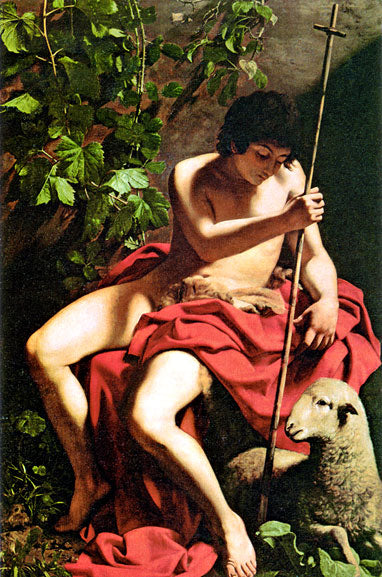Description
The painting "Juan el Bautista" by Caravaggio, made in 1598, is a work that encapsulates the distinctive features of the master Italian, famous for its innovative use of chiaroscuro and its ability to instill emotional realism in their work. In this work, Caravaggio represents Juan Bautista in a moment of introspection, capturing the essence of a crucial character of Christianity, known for his role as a precursor of Christ. The figure of Juan, portrayed in an almost monumental foreground, is found in a natural pose, which encourages the connection between the spectator and the saint.
At the compositional level, Caravaggio opts for an intimate and concentrated approach. The baptist figure is the undisputed center, occupying most of the painting and dominating space through a pose that still seems to exude modesty and dignity. This approach results in an intense visual dialogue, where the viewer's gaze is attracted to John's pale face, which contrasts with a dark and nebular background. This use of the dark background not only accentuates the main figure, but also creates an atmospheric environment that invites contemplation.
The use of color is another fascinating aspect of this work. Caravaggio uses a palette of earthly tones and meats, which accentuate Juan's humanity. The skin of the saint is dramatically illuminated, with shadows that hint the texture and volume of his face and body. The subtle variations of light and shadow generate a sense of three -dimensionality that is characteristic of their style, highlighting their mastery in representation of human physical formatting.
The symbolism in the work also deserves attention. In John's hand, there is a representation of the Lamb, which refers to his role as a precursor of Christ, a detail that Caravaggio suggests with a masterful visual economy. This subtlety not only creates layers of meaning, but also enters conversation with the iconographic traditions of his time, by presenting Juan not only as a prophet, but as a symbol of salvation.
Despite being a deeply religious work, "John the Baptist" can also be interpreted as a reflection of Caravaggio's talent to represent the psychology of his characters. John's introspective look suggests an internal reflection on his divine mission, a genuine spiritual connection that transcends the scope of the physical. This humanizing approach is one of the hallmarks of the Caravaggiesco style, where religious saints and figures are presented with a raw and authentic humanity.
Within the corpus of Caravaggio's work, "John the Baptist" shares similarities with other of his encapsulations of biblical characters, as in "The vocation of St. Matthew" or "The Burial of Christ." In all of them, you can see how the master Use the chiaroscuro to emphasize not only the action, but the emotional state of its characters.
In conclusion, "John the Baptist" of Caravaggio is more than a portrait of a saint; It is an intimate and dramatic exploration of faith, humanity and light. Through its innovative use of color and composition, Caravaggio manages to make this work a enduring testimony of its genius and its ability to capture the essence of the sacred through everyday life, a feature that continues to fascinate the spectators and scholars of the art. This work is erected as a splendid example of the early baroque, inviting contemplation not only of the figure of John, but of the complexities of the human condition itself.
KUADROS ©, a famous paint on your wall.
Hand-made oil painting reproductions, with the quality of professional artists and the distinctive seal of KUADROS ©.
Reproduction service paintings With a guarantee of satisfaction. If you are not completely satisfied with the replica of your painting, we refund your money 100%.

